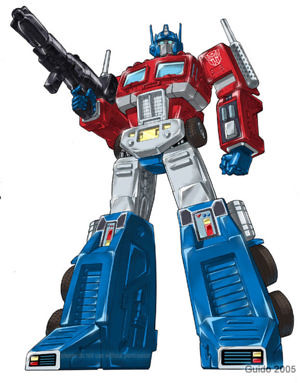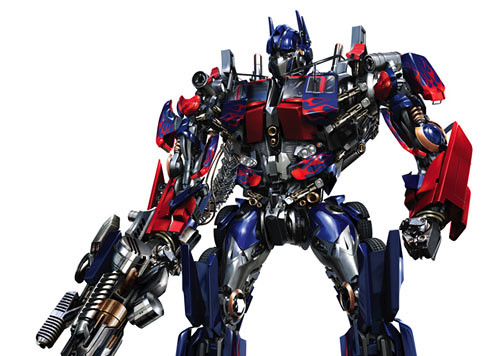I had a sermon to preach about Optimus Prime some day. For better or worse, WIRED magazine beat me to it. Pointing out that while geeks have Batmen and Star Trek toys in their cubicles, even the jocks have Transformers decorating their workspaces, WIRED writer Scott Brown explores the reasons why in the July print edition.
“.in 1986, the original Prime did something that distinguished him from most other cartoon heroes. He died. He died for freedom, for righteousness”. Brown goes on to assert that American culture American males are looking forward to the July 4th release of the “live-action” Transformers movie for “more than galvanic summer thrills or simple nostalgia. They’re looking for redemption, as men.”

While Brown forgets to mention Optimus did resurrect from the dead to “light our darkest hour” in 1987, missing the exclamation point on his Semi-Christophany, he strikes a narrative chord that is unmistakable. Bouncing between comparing Prime to a father and “Our Father…” the WIRED writer demonstrates how this hydraulic hero became a surrogate object for kids to respect, mimic, and yes even worship:
“Prime practically parented the latchkey kids of the mid-“80s. He was our Allfather at a time when flesh-and-blood role models were increasingly few and far between”.
Indeed. While I had a solid Christian dad and stay-at-home mom at our tiny home in Kent, I remember scrambling to the television when voice actor Peter Cullen would command the troops to “Roll out!” and my second father with a voice like John Wayne playing Abraham Lincoln would contort into a Mack Truck, rev his engine, and roll his crushing 16-wheels down the heroic highway, barreling over the face of evil with unstoppable resolve. An action figure, Rubik’s cube, and Tonka toy all rolled into one, combined with an unshakeable morality and sacrificial love, even the “tech specs” on his packaging in 1984 proclaimed his mission to bring freedom to “all sentient beings”. 23 years later, his steely face is plastered on a poster with a single word: “protect”. It’s no wonder so many boys laid their weekly allowance on the energon altar.
Father of the fatherless and protector of widows is God in his holy habitation.
– Psalm 68:5
True to postmodern form, Transformers emerged in the 80s with a marketing ploy few realized would have such a dramatic impact on our generation. Before the 80s, toys were rarely so linked with a “ready-mixed narrative”. George Lucas’ merchandising success with Star Wars coupled with the deregulation of television advertising to children in 1983 opened the door for this phenomenon. Toys were tied to a sweeping story (and usually a story that demanded you buy them all). Little did we know it would do more than simply enhance merchandising; it would give a generation something to believe in when dad and the local parish had failed; it would give boys an animated role model. and perhaps even a Cybertronian god.
This is why so many people I know are polarized: excited or exacerbated, feverish or furious, titillated or ticked off, by the Michael Bay directed / Steven Spielberg produced return of Optimus and the bots, transforming into box office revenue on 2007’s Independence Day. This is why a holiday once owned by Will Smith has handed over the fireworks – and 150 million dollars – to the 21st century version of Rock ’em Sock ’em Robots. This is why MuteMath is delivering yet another version of the memorable theme song, reminding us that “Autobots wage their battles to destroy the evil forces of the Decepticons.”

The question on everyone’s lips: “When Papa comes truckin’ home, will we recognize him?”
With a lack of faith in earthly fathers, and lacking a relationship with God, who is our Father, I can see the grand attraction of a robot that is both “Optimal” and in his “Prime”. Intentional or not, there is something godlike built into the stoic Autobot Commander, a titanium trinity imaging a loving Father, a sacrificial Son, and even an indwelling Spirit represented by the “Matrix of Leadership” he carries in his heart (or cab). To a lesser degree, he also represents a rugged, brass-knuckle, rubber-meets-the-road manliness that contemporary culture has slowly leeched from its men. Optimus Prime is a desperate grab for God, daddy, and lost masculinity.
“With bated breath and shaken faith we await the return of our Almighty Rig. Because without Prime, we’re stuck with whiney Spider-boys, metrosexual pirates, and koan-spouting kung-fu Christs in designer sunglasses and unisex clubwear. Because these days, the only real men left are giant robots.”

Just a toy? Purely nostalgia? WIRED certainly doesn’t think so, and neither do I. Truly, there is something going on here that is more than meets the eye.


James, while I was considering not seeing this movie due to the very realistic fear that Michael Bay’s re-invisioning would screw up yet another great part of our generation’s childhood (as he has a history of doing)…based on this awesome write up, I’ve been transformed, I will have to go watch it.
Hey James, Fabulous…I grew up watching Transformers and was stoked to hear of the new movie coming out…definately want to see it…But I had forgot so much of the past story lines including the death of optimus prime…Thank you for giving me more ideas as to what I could or should be thinking about theologically as I watch this film…so often we leave theology by the wayside for entertainment and forget that they can go hand in hand…like forgivness and redemption in a recent 3rd movie of a comic back a couple months ago…
[…] I must admit my favorite Christmas was the morn’ of 1985 when I awoke to find my very own Optimus Prime under the tree. James Harleman has some great insights as to why there is such an appeal behind our beloved hero and star of the upcoming movie TRANSFORMERS.Read the entire article here. […]
[…] Content Previous […]
[…] Hill’s James Harleman writes about the deeper meaning behind Transformers’ Optimus Prime as featured in the current issue of […]
[…] previously mentioned, I always looked up to Optimus Prime, as father figure and perhaps Savior, like millions of other American boys in the 80s. Part of me desired to be one of Prime’s […]
[…] Cinemagogue – Optimus Prime Gets WIRED! […]
[…] dealt with longstanding characters like Optimus Prime, Bumblebee and Starscream in other posts. Sitting in the new film, I remembered the story in 2 […]
[…] – Optimus Prime gets WIRED!, James […]
[…] July, gathering around the world to stare at one of 4,050 movie screens, I waited breathlessly for Optimus Prime and his band of disguised robots to transform. However, something peculiar occurred as we sat […]
This Wired article hits the nail on the head. The cartoon had simple plots and pretty bad animation, but the character found in Prime rang true.
It is interesting to note what an archetype of servant leadership is written into the character of Optimus Prime. I just hope that continues to be the case in the movies.
quotableoptimusprime.blogspot.com
[…] they keep it open.†With the first film starting at sunset – nearly 9:30 – I realized that Optimus Prime’s sage voice wouldn’t even resonate until almost 11:30, and we were slated to be sitting at this […]
[…] theme that crops up in this type of fantasy story, and examined the spiritual underpinnings of Optimus Prime. Folks turned out from multiple campuses as well as first-timers to Mars Hill, which made for a […]
[…] Optimus Prime, daddy to latchkey kids through afternoon animation with programmed parenting that made even Wired Magazine comment. To bring things full circle from summer 2007 to summer 2008, Transformers star Shia LeBeouf will […]
[…] an eleven year old boy when they debuted; it was inevitable. Whether it’s my commentary on the fatherly nature of Optimus Prime, my musings about fan favorites Bumblebee and Starscream, or the text review of the […]